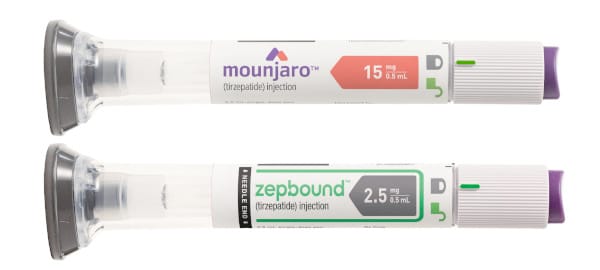What's the difference between GIP and GLP1?

Both sound similar, and do similar things, but what is the difference?
Well both of them are "incretin hormones", hormones that cause reductions in blood sugar:

Incretin hormones are important to weight loss and type 2 diabetes management because they reduce blood sugar.
Incretin hormones make your body release more insulin, which controls what your body does with blood sugar – turning it into muscle or fat, for example.
What is GLP1?
GLP1 stands for "Glucagon-Like Peptide 1". GLP1 is a hormone that your body produces naturally while helps you reduce appetite and feel fuller.
Normally "GLP1" is used in the phrase "GLP1 Receptor Agonist", which is the general name for a class of drugs (that this website is about) which helps treat type 2 diabetes and manage weight. GLP1 drugs work by being a triggering the same reactions that natural GLP1 does in your body.
Check out our quick explainer
GLP1 is well studied and it's effects are well known, but in general it:
- Encourages the release of insulin
- Delays movement speed of food through the intestines
- Encourages positive cell regeneration in the brain
What is GIP?
GIP stands for "Glucose-dependent insulinotropic polypeptide". It's name is a lot longer than GLP1, but it works in a very similar way.
GIP also helps influence memory formation and regulate appetite and feelings of fullness.
While GIP is much less well studied than GLP1, it's major functionality encouraging insulin production makes it a great pair to boost the effectiveness of GLP1.
What are the differences?
Now that we're familiar with what GLP1 and GIP are, here's how they're actually different:
- GIP and GLP1 bind to different hormone recepors
- GIP is thought to promote bone formation
- GIP increases fat accumulation
- GLP1 has positive protective effects on the heart
- GLP1 considered more likely to suppress appetite
- GLP1 has more neuroprotective effects (it is being investigated as a treatment for Alzheimers, for example)
Here's an excellent paper on the differences:

You can read the full text of that paper online as well.

So what?
It's important to know the difference between these two because different formulations of GLP1 drugs can have both GLP1 and GIP agonists in them.
For example, Tirzepatide is a combination of both GLP1 and GIP agonists:

This study summarizes findings that Tirzepatide is more effective than simply semaglutide alone (which is only a GLP1 Receptor Agonist).
While you might not recognize the name right away, you'll probably recognize the name brands that contain Tirzepatide:

Knowing whether a weight loss medication is primarily GIP or GLP1 is important and can change how it works/affects patients.
Is a formulation consisting of both GLP1 and GIP right for you? That's a conversation to have with your primary care physician or other qualified medical professional, but the research is out there for you to read, and prepare for that conversation.





